|
Thousands protest
against Ma
BIG GUNS: Su Tseng-chang, Annette Lu, Frank
Hsieh, Tsai Ing-wen and Yu Shyi-kun all joined demonstrators on the streets of
Taipei yesterday
By Chris Wang / Staff reporter
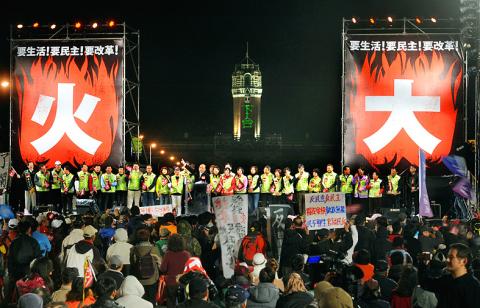
Opposition politicians rally on
the stage flanked with Chinese characters that read: "Fury" during a protest
against the President Ma Ying-jeou in Taipei yesterday.
Photo: Taipei Times
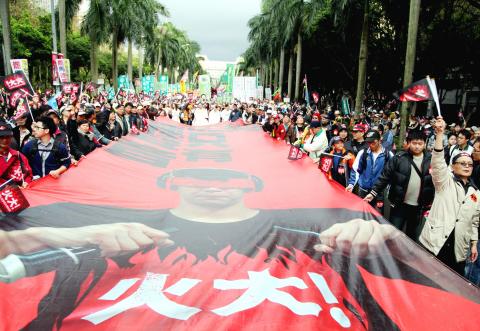
Tens of thousands of people march
through Taipei yesterday to protest against President Ma Ying-jeou, blaming him
for the nation’s economic and social problems and demanding Ma reshuffle his
Cabinet or resign.
Photo: David Chang/EPA
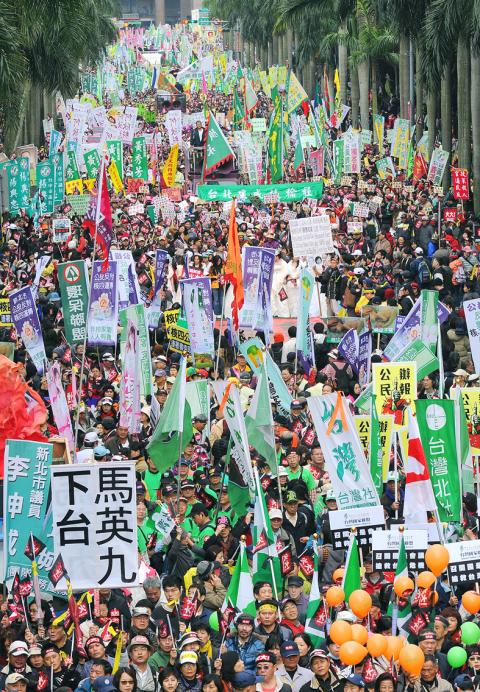
Supporters of Taiwan`s main
opposition Democratic Progressive Party (DPP) hold placards as they take part in
a demonstration in Taipei yesterday.
Photo: AFP
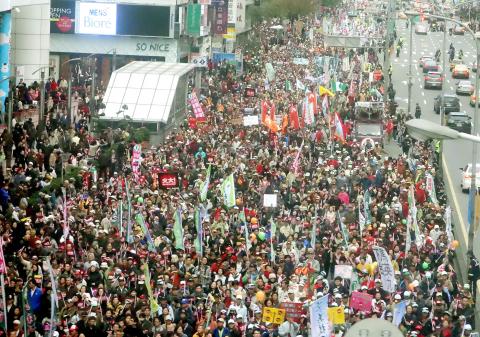
The Democratic Progressive
Party’s “Fury” rally against the government passes through Taipei yesterday. The
rally, which started at the Sun Yat-sen Memorial Hall, ended in front of the
Presidential Office.
Photo: Lu Chun-wei, Taipei Times
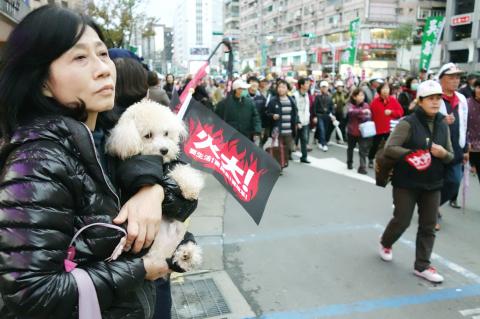
A bystander watches as the rally
passes through Taipei yesterday.
Photo: Lu Chun-wei, Taipei Times
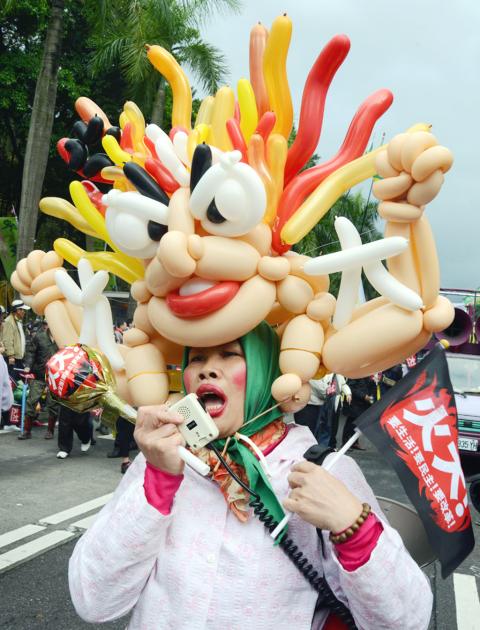
A woman wears a fire-shape
balloon hat as she marches during the Democratic Progressive Party’s “Fury”
rally against the government in Taipei yesterday.
Photo: Sam Yeh / AFP
At least 100,000 protesters yesterday
gathered in front of the Presidential Office in Taipei and demanded President Ma
Ying-jeou (馬英九) step down, in the first mass demonstration since Ma was
re-elected in January last year, while the leader of the opposition said he had
initiated efforts to recall the president.
The Democratic Progressive Party (DPP), the organizer of the “Fury (火大)” rally,
estimated that about 200,000 people participated in the protest. Police
authorities estimated the number of protesters to be about half that figure.
As overnight rain stopped about noon and the weather was warmer than expected,
the protest began on time at 3pm at Sun Yat-sen Memorial Hall, with participants
marching down Renai Road and Zhongxiao E. Road in high spirits toward the
assembly point in front of the Presidential Office on Ketagalan Boulevard.
Taipei police said they had dispatched 500 police officers to maintain order
along the route of the rally. An additional 300 police officers were deployed
around Ma’s residence to prevent a repeat of protests by students and workers
outside the residence which took place on Dec. 30 last year.
Prior to the protest, DPP spokesman Lin Chun-hsien (林俊憲) said the party aimed at
drawing more than 100,000 participants to the event and had mobilized 50,000
people, about 60 percent of whom were from Taipei, New Taipei City (新北市),
Taoyuan County and Yilan County.
Buses that set off from southern Taiwan — the DPP’s traditional stronghold —
were also well loaded with participants in high spirits and eager to press their
appeals to the government, Lin said.
The protest, which the DPP had been working on for nearly a month, came with
three demands for the government: a Cabinet reshuffle, a rejection of the
controversial Next Media Group (壹傳媒集團) deal and the organization of a national
affairs conference.
DPP Chairman Su Tseng-chang (蘇貞昌) said last week that if Ma agreed to the three
demands, the DPP would cancel the protest. The Ma administration did not respond
and went on to block DPP-led amendments to media acts in the legislature on
Friday.
Led by Su, party heavyweights, including former DPP chairperson Tsai Ing-wen
(蔡英文), former vice president Annette Lu (呂秀蓮) and former premiers Frank Hsieh
(謝長廷) and Yu Shyi-kun, as well as DPP six commissioners, attended the protest.
“Incompetent president, the public are furious,” protesters chanted as they held
up signs and banners to show their discontent at Ma’s perceived failure in
almost every aspect of government, in particular over the economy.
They arrived at the assembly point at 5pm for a nighttime rally.
“I’m very disappointed with the Ma administration. Not only has Ma been unaware
of his incompetence and poor performance, he has refused to listen to the
public’s voice,” a farmer, surnamed Liu, from Changhua County said.
The crowd chanted “reject the deal” when they passed the National Communications
Commission (NCC) building on Renai Road, demanding that the commission, which
regulates broadcasting media, veto the Next Media deal.
People’s disappointment with the government seemed to extend beyond its economic
performance and media regulation, with many indicating discontent with the
entire Chinese Nationalist Party (KMT) administration, both central and local
governments.
Various advocacy groups attended the protest and highlighted their own causes,
such as closing nuclear power plants, stopping illegal land expropriation and
supporting press freedom in China. Some demonstrators, including several foreign
residents in Taiwan, also held banners to protest what they said was Taipei
Mayor Hau Lung-bin’s (郝龍斌) inappropriate handling of night market regulations.
A ray of green laser light was projected onto the outer surface of the
Presidential Office with the characters for “fury,” “incompetent” and
“responsibility,” reflecting how the protesters felt about the president.
The nighttime rally, which consisted of speeches by students, politicians and
representatives from various social groups as well as performances by several
local rock bands, concluded at about 9:30pm.
Coincidentally, yesterday was a symbolic date for both Ma and the DPP.
Former president Chiang Ching-kuo (蔣經國), who Ma served under and idolizes, died
on Jan. 13, 1988. Former DPP presidential candidate Tsai Ing-wen concluded her
election campaign on Jan. 13 last year, hoping to become the first female
president in the nation’s history, but eventually lost to Ma by 800,000 votes.
Last night in front of the Presidential Office, Su officially launched the
party’s counter offensive against Ma and said that the DPP would try to recall
him and replace “any incompetent” KMT lawmaker and official.
“This is more than just a demonstration. This is the beginning of a reform
movement, a resistance movement of the people against incompetent government as
well as the beginning of a battle between reformists and anti-reformists,” Su
told supporters.
Citing a video recorded in 2006, in which Ma asked former president Chen
Shui-bian (陳水扁) to step down over his low approval ratings, Su urged Ma “not to
forget what you said.”
“Ma said that ‘if you did not step down, people would make you,’ and that is
what we want to remind him right now,” Su said.
Su said Ma and the KMT could be labeled as being anti-reformists over what they
have done in the past and the DPP would adopt a three-way strategy against the
government: checks and balances in the legislature, policy recommendations and
public pressure on issues such as nuclear power and pension reform.
“Moreover, we are going to try to replace failed policies, the president,
anti-reform lawmakers and government officials,” Su said
Before Su, several DPP heavyweights also called on Ma to take a good look at
himself.
“A president who has made his people suffer and brave the cold wind and march on
the streets for their rights should be ashamed of himself,” Tsai said.
The conflicts and division within society have reached breaking point with the
country’s future at stake, she said.
“This is a time for solidarity as, throughout Taiwan’s history, we could always
sit down for a discussion and find the right direction,” Tsai said, adding that
a national affairs conference is necessary for resolving the country’s woes.
Ma does not know how to resolve the current problems and refuses the DPP’s
assistance, former premier Frank Hsieh said.
“If he knows he has made a mistake then he has to correct it. If he does not
know how to do it, he should resign. If he does not resign, people will make him
step down. That is what democracy is all about,” Hsieh said.
Additional reporting by Rich Chang and CNA
|
![]()
![]()
![]()